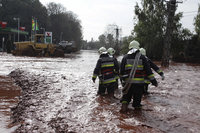Toxic sludge from Hungary may cause severe damage to Danube river
 The Danube river has suffered no damage so far from a toxic sludge spill in Hungary, officials said today. The announcement eased fears of an environmental disaster in one of Europe's most important waterways.
The Danube river has suffered no damage so far from a toxic sludge spill in Hungary, officials said today. The announcement eased fears of an environmental disaster in one of Europe's most important waterways.
Hungarian disaster officials said alkaline levels in the Danube were normal after emergency crews poured plaster and acetic acid (vinegar) into rivers that flowed into it, The Guardian reports.
Alkalinity was measured at about 8 on the 14-point pH scale in the affected parts of the Danube, Tibor Dobson, a spokesman for the country's emergency services, said by phone. The pH level was 13 at the site of the spill and the sludge killed all wildlife in the Marcal, the first river it reached.
"The current pH level in the Danube is absolutely not dangerous for the flora and fauna of the river," Dobson said. "It appears that we managed to save the river's wildlife."
Four people were killed and more than 100 injured this week when a reservoir burst, disgorging an estimated 1 million cubic meters (35 million cubic feet) of sludge, a bigger volume than the oil spilled into the Gulf of Mexico after the explosion of BP Plc's Deepwater Horizon drilling rig in April, Bloomberg reports.
Greenpeace is warning of "surprisingly high" levels of arsenic and mercury in the red sludge that seeped out of a burst reservoir in Hungary and has devastated the surrounding area.
The activists say samples taken Tuesday in the town of Kolontar showed 110 milligrams of arsenic and 1.3 milligrams of mercury per kilogram of dry matter. The result, which also show 660 milligrams of chrome per kilogram, are based on analyses carried out in laboratories in Vienna and in the Hungarian capital, Budapest, The Associated Press reports.
Subscribe to Pravda.Ru Telegram channel, Facebook, RSS!


